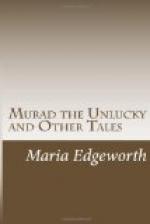choice, and was at last obliged to assert, in opposition
to the domineering abbe, her right to judge and decide
in her own affairs. With seeming politeness,
he begged ten thousand pardons for his conscientious
interference. No more was said upon the subject;
and as he did not totally withdraw from her society
till the revolution broke out, she did not suspect
that she had anything to fear from his resentment.
His manners and opinions changed suddenly with the
times; the mask of religion was thrown off; and now,
instead of objecting to Sister Frances as not being
sufficiently strict and orthodox in her tenets, he
boldly declared that a nun was not a fit person to
be intrusted with the education of any of the young
citizens—they should all be
des eleves
de la patrie. The abbe, become a member
of the Committee of Public Safety, denounced Madame
de Fleury, in the strange jargon of the day, as “
the
fosterer of a swarm of bad citizens, who were nourished
in the anticivic prejudices de l’ancien
regime,
and fostered in the most detestable superstitions,
in defiance of the law.” He further
observed, that he had good reason to believe that
some of these little enemies to the constitution had
contrived and abetted Monsieur de Fleury’s escape.
Of their having rejoiced at it in a most indecent
manner, he said he could produce irrefragable proof.
The boy who saw Babet tear down the placard was produced
and solemnly examined; and the thoughtless action
of this poor little girl was construed into a state
crime of the most horrible nature. In a declamatory
tone, Tracassier reminded his fellow-citizens, that
in the ancient Grecian times of virtuous republicanism
(times of which France ought to show herself emulous),
an Athenian child was condemned to death for having
made a plaything of a fragment of the gilding that
had fallen from a public statue. The orator,
for the reward of his eloquence, obtained an order
to seize everything in Madame de Fleury’s school-house,
and to throw the nun into prison.
CHAPTER IX
“Who now will guard bewildered
youth
Safe from the fierce assault of
hostile rage?—
Such war can Virtue wage?”
At the very moment when this order was going to be
put in execution, Madame de Fleury was sitting in
the midst of the children, listening to Babet, who
was reading AEsop’s fable of The old man and
his sons. Whilst her sister was reading,
Victoire collected a number of twigs from the garden:
she had just tied them together; and was going, by
Sister Frances’ desire, to let her companions
try if they could break the bundle, when the attention
to the moral of the fable was interrupted by the entrance
of an old woman, whose countenance expressed the utmost
terror and haste, to tell what she had not breath to
utter. To Madame de Fleury she was a stranger;
but the children immediately recollected her to be
the chestnut woman to whom Babet had some years ago
restored certain purloined chestnuts.




